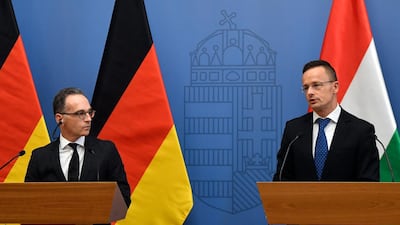Germany’s Foreign Minister on Monday said Iran’s claim of developing advanced machines to quicken uranium enrichment jeopardises the 2015 nuclear deal.
Heiko Maas urged Tehran to return to the agreement.
Iran has been gradually reducing its commitment to the deal since the US withdrew from it last year and reimposed sanctions, blocking its oil exports to pressure Tehran into negotiating stricter limits on its nuclear programme.
Under the agreement between Iran and world powers, Tehran is limited to enriching uranium with just over 5,000 of its first-generation IR-1 centrifuges, which are widely considered to be outdated.
But the new IR-6 machines can refine uranium 10 times faster.
“Iran has built very advanced centrifuges, which do not comply with the agreement,” Mr Maas said in Hungary.
Tehran was now operating 60 IR-6 advanced centrifuges and its scientists were developing an IR-9 able to enrich 50 times faster than IR-1s, its nuclear agency chief Ali Akbar Salehi told state television earlier on Monday.
Iran said the move was a direct result of US President Donald Trump pulling out of the agreement.
Mr Maas called it unacceptable.
The nuclear deal, under which international sanctions against Iran were lifted, was designed to extend the time Tehran would need to obtain enough fissile material for a nuclear bomb to about a year from a couple of months.
Tehran denies ever having sought to build a nuclear bomb.
Mr Maas also spoke of tension with Nato ally Turkey over its incursion into Syria on October 9 to attack the Kurdish YPG militia, after Mr Trump’s abrupt withdrawal of US troops.
He said Turkey was an important Nato member but Berlin expected it to act as a partner.
Mr Maas said Germany would uphold its ban on the export of arms to Turkey that could be used in Syria.
He said the EU should speak with a common voice on matters related to the US, China or Turkey, whose President, Recep Tayyip Erdogan, is due to visit Hungarian Prime Minister Viktor Orban on Thursday.
The EU said earlier on Monday that it was still committed to the 2015 nuclear deal with Iran, even as that deal continues to collapse.
Maja Kocijancic, a spokeswoman for the European Commission, said on Monday that the deal “is a matter of our security, not just the region or Europe but globally".
But Ms Kocijancic said the EU’s commitment to the deal “depends on the full compliance by Iran.”
The Trump administration on Monday announced sanctions on Mojtaba Khamenei, the second son of Iran’s supreme leader Ayatollah Ali Khamenei, and eight other advisers including Ali Akbar Velayati and the head of the judiciary, Ebrahim Raisi.

